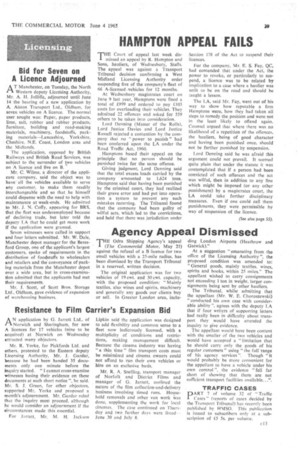HAMPTON APPEAL FAILS
Page 41

If you've noticed an error in this article please click here to report it so we can fix it.
THE Court of appeal last week dismissed an appeal by R. Hampton and Sons, hauliers, of Wednesbury, Staffs. The appeal was against a Transport Tribunal decision confirming a West Midland Licensing Authority order suspending five of the company's fleet of 66 A-licensed:vehicles for 12 months.
At Wednesbury magistrates court on June 9 last year, Hamptons were fined a total of £999 and ordered to pay £105 costs for overloading their vehicles. They admitted 22 offences and asked for 559 others to be taken into consideration.
Lord Denning (Master of the Rolls), Lord Justice Davies and Lord Justice Russell rejected a contention by the company that no "power to punish" had been conferred upon the LA under the Road Traffic Act, 1960.
, Hamptons based their appeal on the principle that no person should be punished twice for the same offence.
Giving judgment, Lord Denning said that the total excess loads carried by the company amounted to 1,624 tons. Hamptons said that having been punished by the criminal court, they had realized their grave error and had put into operation a system to prevent any such mistakes recurring. The Tribunal found that the company had been guilty of wilful acts, which led to the convictions, and held that there was jurisdiction under Section 178 of the Act to suspend their licences.
For the company, Mr. E. S. Fay, QC, had contended that under the Act, the power to revoke, or particularly to suspend, a licence was to be related by implication to a case where a haulier was unfit to be on the road and should be taught a lesson.
The LA, said Mr. Fay, went out of his way to show how reputable a firm Hamptons were, how they had taken all steps to remedy the position and were not in the least likely to offend again. Counsel argued that where there was no likelihood of a repetition of the offences, the hauliers, being of good character and having been punished once, should not be further punished by suspension.
Lord Denning said he was afraid this argument could not prevail. It seemed quite plain that under the statute it was contemplated that if a person had been convicted of such offences and the act was wilful, then in addition to any fine which might be imposed (or any other punishment) by a magistrates court, the LA could take further disciplinary measures. Even if one could call them punishments, they were permissible by way of suspension of the licence.
























































































































